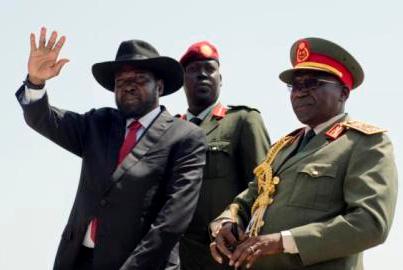South Sudan president rejects UN sanctions on top commanders
July 12, 2015 (JUBA) – South Sudanese president Salva Kiiir has reiterated his rejection to the United Nations sanctions imposed on three of the army’s top military officers allied to his regime against opposition forces in the country, describing it “a misguided” move.

Major-Gen. Marial Chanuong Yol Mangok, commander of president Salva Kiir’s presidential guard, Lt. Gen. Gabriel Jok Riak, whose forces are fighting in Unity state and Major-Gen. Santino Deng Wol, who led an offensive through Unity state in May in which several people died were affected from the government’s side.
On the armed opposition side, the sanctions targeted Major-Gen. Simon Gatwech Dual, chief of the general staff, Major-General James Koang Chuol, who led attacks in Upper Nile state, and General Peter Gadet, the rebels’ deputy chief of staff for operations.
In his response on Sunday to the sanctions through his press secretary, Ateny Wek Ateny, president Kiir believed the sanctions will instead obstruct the peace process.
“We believe the path to justice and tranquillity is only through dialogue. Foreign sanctions are misguided, and we need to remove obstacles obstructing peace not create new ones,” Ateny said in a statement he extended to Sudan Tribune on Sunday.
“Sanctions imposed on South Sudan will not only hinder the peace process but inherently be felt by our countrymen and women down to the very basic level,” he said.
The government, according to the presidential spokesman, was firmly committed to finding a lasting solution at the negotiation table rather than in the battle field.
“Our primary focus must [be] to create a sustainable political reality that will no longer be held hostage by threats of violence and war,” he said, adding.
He said the country was in the middle of a difficult time, describing it as “a horrific cycle of violence”, but claimed that more than ever before the government was committed to peace, democracy and prosperity for all citizens.
The statement further attempted to justify the actions of the government forces on offensive as part of their responsibility to defend the country and its citizens.
“A sovereign nation, we are tasked with the greatest rights, protecting our people and our land as we are committed to filling that right in pursuit of justice for our nation,” Ateny added.
This is the path to prosperity, he said, adding that the government asked the international community to help pave roads rather than create obstacles obstructing peace efforts to arrest the war.
The rebel group in earlier reaction to the sanctions said they were the “victim” resisting the government and should not therefore be equated to the regime which faked a coup attempt, started war and carried out genocide in the capital, Juba.
(ST)
